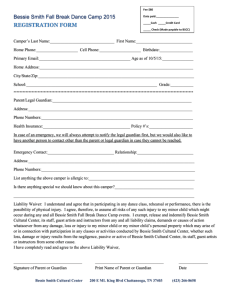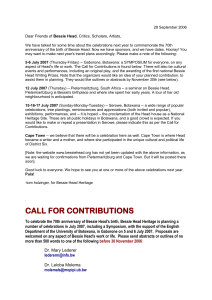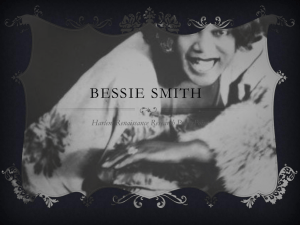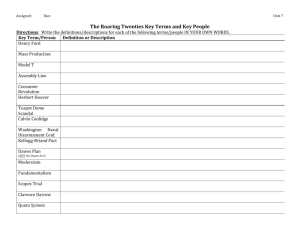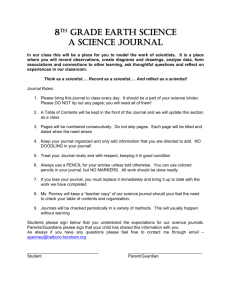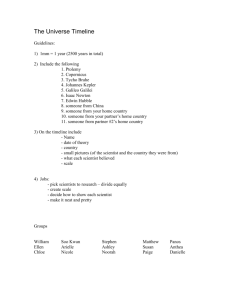ABC Book of Great Women Scientists
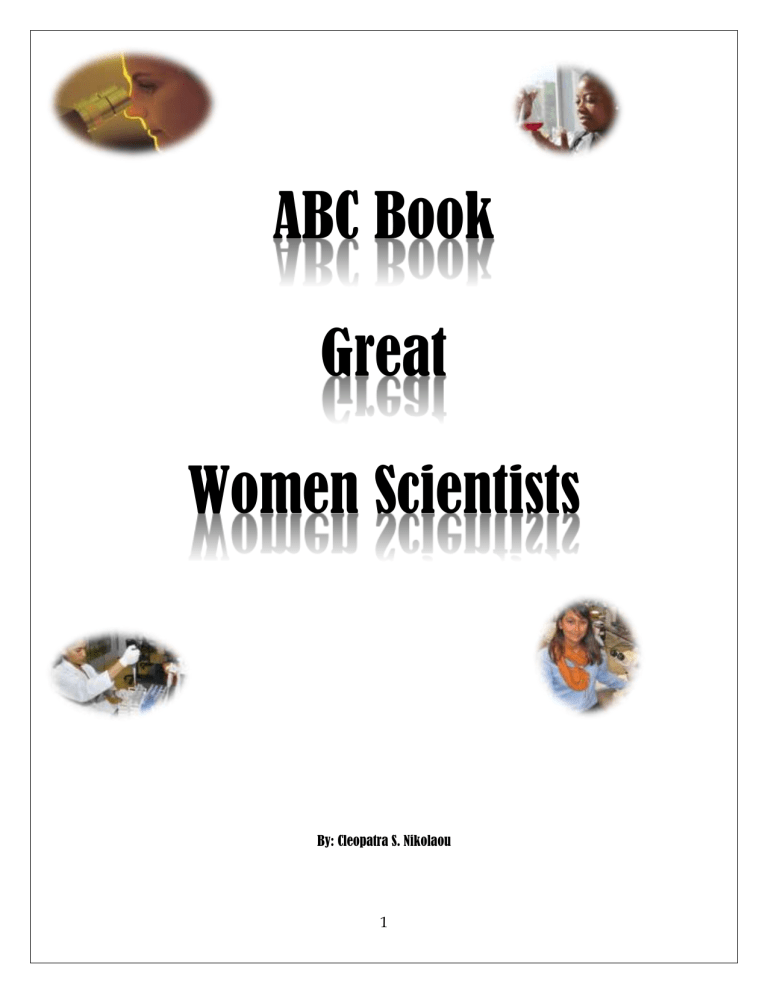
ABC Book
Great
Women Scientists
By: Cleopatra S. Nikolaou
1
Aa
is for Annie Easley: Computer Scientist
Annie Easley was an American mathematician and rocket scientist who was born on April 23, 1933 in
Birmingham, Alabama and died on June 25, 2011 in Cleveland, Ohio. Annie is known for being a clever, computer scientist. She worked for National Aeronautics and Space Administration (NASA) as one of the top computer programmers. She is one of the first African American women to work in the computer field. She worked for NASA as a computer scientist for 34 years!
2
Bb
is for Bessie Coleman: Pilot
Up-Up and away! Bessie Coleman was an ambitious African American woman who dreamt of becoming a pilot. Bessie was born on January 26, 1892 in Atlanta, Texas, and died on April 30, 1926 in
Jacksonville, Florida. Bessie and her family were very poor. Bessie’s family could not afford to pay for
Bessie to go to pilot school. So she worked really hard as a bookkeeper and manicurist. Bessie saved up her own money to pay for pilot school. When Bessie earned enough money to go to pilot school, she moved to France and attended AFI. Bessie felt comfortable in France because African women could go to school to be pilots. Aviation schools in the United States did not allow African American women to earn pilot licenses. Bessie specialized in stunt flying. She performed many in-flight tricks.
Bessie remains a pioneer of women in aviation.
3
Cc
is for Catherine Greene: Inventor
Catherine Green was born on February 17, 1755, off the coast of Rhode Island on Block Island, and died on September 2, 1814 on Cumberland Island.
Much controversy surrounds the life story of
Catherine. For many years Eli Whitney was given sole credit for inventing the cotton gin, which transformed the agricultural business in the south. Now, people believe that Catherine may have played a huge role in the development and design of the cotton gin. However, Catherine was never given credit for her contribution of the cotton gin.
4
Dd
is for Diane Fossey: Zoologist
Diane Fossey was born on January 16, 1932 in San Francisco, California, and died on December 27,
1985 in Volcanoes National Park, Rwanda. She was an American zoologist who worked very closely with gorillas. Diane lived in the wild to observe the gorillas’ daily lives. She sometimes had to live in the mountains and forests of Rwanda. Diane loved her work and she was a dedicated scientist.
5
Ee
is for Elizabeth Blackwell: Medical Doctor (obstetrics and gynecology)
Elizabeth Blackwell was born on February 3, 1821 in Bristol, England and died on May 31, 1910 in
Hastings, England. Elizabeth was the first woman to receive a medical degree from an American medical school, and the first woman to enroll on the medical register in the United Kingdom.
Elizabeth literally paved the road for future women interested in becoming a doctor.
6
Ff
is for Florence Nightingale: Nurse and Mathematical Statistician
Florence Nightingale was born on May 12, 1820 in Florence, Grand Duchy of Tuscany and died on
August 13, 1910 in England. Florence is known as the founder of modern nursing. She opened the first nursing school in the world. Florence dedicated her time and love to educating the public about medical knowledge. Florence was also a mathematical statistician. She was the first person to introduce statistics into the public health system. She also introduced the pie chart!
7
Gg
is for Georgia Dwelle: Medical Doctor
Georgia Dwelle was born on 1884 – 1977. Georgia is known for creating many medical program that helped African American women. For example, she was the first to establish the obstetrical “lying-in” hospital in Atlanta. She was also the first to establish a venereal disease clinic for African American women in Georgia. She wanted to make sure that African American women had the medical care they needed to stay healthy. She also founded the first “Mother’s Club” for African American women in Georgia.
8
Hh
is for Henrietta Leavitt: Astronomer
Henrietta Leavitt was born on July 4, 1868, in Lancaster, Massachusetts and died on December 12,
1921 in Cambridge, Massachusetts. Henrietta was loyal to her family and to her work. Henrietta was almost totally deaf. However, this did not stop her from accomplishing a leading career. Henrietta was the first to discover the relationship between the brightness in stars and the stars time period.
This discovery was huge because it enabled scientist to use this discovery to measure the distance between Earth and distant galaxies. Unfortunately, while Henrietta was alive, she did not receive any major awards for all the major contributions she made in astronomy.
9
Ii
is for Ida Eva Tacke: Physicist
Ida Tacke was born on February 25, 1896 in Lackhausen, Germany and died on September 24, 1979 in a city west of Germany. Eva is best known for her discovery of element 75-Rhentium. She also was the first to discover element 43, but was not given recognition. She was also the first to mention the idea of fission but her idea was not taken seriously. Many say that she was not given credits for her contributions to science because she was a woman.
10
Jj
is for Julia Morgan: Architect
Julia Morgan was born on January 20, 1872 in San Francisco, California and died on February 2, 1957.
She was the first American woman to receive her architect license in the state of California. She designed over 700 hundred buildings, but she is best known for designing the Hearst Castle in San
Simeon. She also designed a great deal of building that serviced girls and women around the nation.
11
Kk
is for Kate Gleason: Engineer and businesswoman
Kate Gleason was born on November 25, 1865 in Rochester, New York, and died on January 9, 1933 in
Kate Gleason, the first woman to be president of a national (U.S.) bank, as well as the first woman member of the American Society of Mechanical Engineers, was born in Rochester, New York, U.S., on
November 25, 1865. In 1918, she was elected the first woman member of the American Society of
Mechanical Engineers (ASME). Kate Gleason died January 9, 1933 in Rochester, New York. She left an estate of $1.4 million, of which a large portion was used to set up a Kate Gleason Fund for charity and education.
12
Ll
is for Lucy H. Taylor: Dentist
Lucy Hobbs Taylor was born on March 14, 1833, in New York and died on October 3, 1910 in
Lawrence, Kan. In 1849, she moved to Michigan, where she served as a schoolteacher for 10 years.
Lucy was the first woman in the world to receive a doctorate in dentistry. When Lucy received her degree, she established a dental practice in Chicago, Illinois. She also was a supporter of women's rights.
13
Mm
is for Mary H. Roessel: Psychiatrist
Mary Roessel was born in 1958. Dr. Mary Roessel was the first person in her Navajo community to attend medical school and become a doctor. Dr. Mary Roessel was the first woman Navajo psychiatrist to provide Indian Health Service in New Mexico. She became a doctor because she wanted to serve the Native people in a meaningful ways. Mary currently practices psychiatry in New
Mexico, U.S.A.
14
Nn
is for Lepaute, Nicole-Reine: Astronomer and Mathematician
Lepaute, Reine was born on January 5, 1723 in Luxembourg Palace, Paris and, died on December 6,
1788 in France. She predicted the return of Halley's Comet, calculated the timing of a solar eclipse and constructed a group of catalogs for the stars. Her contributions continue to have a great impact on astronomy.
15
Oo
is for Olive Beech: Aviation Pioneer and Businesswoman
Olive Beech was born on September 25, 1904 in Waverly, Kansas, and died on July 6, 1993. Olive cofounded Beech Aircraft. She became president and CEO of the company, and changed the company into a multimillion-dollar, international Aerospace Corporation. Olive Ann Beech is known as the
“First Lady of Aviation”. She was the first Kansan welcomed into the Kansas Aviation Hall of Fame.
Pp
is for Patsy Sherman: Chemist and Inventor
Patsy Sherman was born on September 15, 1930 in Minneapolis, Minnesota and died on February 11,
2008. Patsy was the co-inventor of Scotchgard TM. commercial products. Scotchgard was used as a stain and water repellent for fabrics. Back when Patsy began her career, women were not welcomed in male dominated industries. However, Patsy worked hard and became a manager for 3M brand products, which in those days was unheard of.
16
is for Quimby, Edith
Edith Quimby was born in 1891 in Illinois and died in 1982. Edith was a pioneer in the field of radiology. Edith helped develop applications for X-rays, radium, and radioactive isotopes. She was of the first to revolutionize the science of radiology. Her research in measuring the penetration of radiation enabled physicians to determine the exact dosage needed with the fewest side effects.
17
Rr
is for Rosalind Franklin: Biophyscist and X-ray Crystallographer
Rosalind Franklin was born on 25 July 1920 in Notting Hill, London, and died on 16 April 1958 in
Chelsea, London. Rosalind died very young. She was only 37 years old when she died of ovarian cancer. However, before passing away, Rosalind made some critical contributions to the understanding of the molecular structures of DNA, RNA, viruses, coal, and graphite. She helped scientists understand how genetic information is passed from parents to children.
Franklin is best known for her work on the X-ray images of DNA which led to discovery of DNA double helix.
18
Ss
is for Sally Ride: Physicists and Astronaut
Sally Ride was born on May 26, 1951 in Encino, California, and died on July 23, 2012, in La Jolla,
California. She died of pancreatic cancer at the age of 61. Sally lived a very private life. She coauthored six children's science books with her life partner of 27 years, Tam O'Shaughnessy and founded Sally Ride Science in 2001. Sally is known for being the first woman to go into space, and for being the youngest American to be launch into space.
19
Tt
is for Tarquinia Molza: Natural Philosopher
Tarquinia Molza was born on November 1, 1542 in Modena and died on August 8, 1617 in Modena.
Tarquinia Molza was a Renaissance philosopher, writer, musician who lived and worked in Modena and Ferrar in Northern Italy. She was well respected and loved.
Tarquinia was also known as a scholar, studying astronomy and mathematics, as well as poetry, the fine arts, and languages.
20
Uu
is for U!
For any young girl who dreams of becoming a scientist one day. You can be whatever you want to be, just like the women in this book.
21
Vv
is for Vera Cooper Rubin: Astronomer
Vera Rubin was born on July 23, 1928, in Philadelphia, Pennsylvanian and died at the age of 84. Vera is best known for the Galaxy Rotation Problem phenomenon. This phenomenon led to the theory of dark matter. Today, the theory of dark matter best explains the galaxy rotation problem. Dark matter is still a concept that scientist know very little about. However, scientists want to learn more about this type of matter because they believe that it makes up roughly 70% of the universe!
22
Ww
is for Wu, Chien Shiung: Physicist
Chien Shiung Wu was born on May 31, 1912 in Shanghai, and died on February 16, 1997 in New
York. She was born in China and emigrated to the United States.
In 1957, while at Columbia
University, she disproved the law of conservation of parity, which had been one of the basic assumptions in physics.
23
Xx
is for X-ray
X-ray technology is very important to the well-being of people. Dorothy Hodgkin was a chemist who revolntionzed X-ray techinogly forever! Dorothy was born on May 12th, 1910 in Cairo, Egypt and died on July 29, 2004 in Shipston-on-Stour, United Kingdom. Since Dorothy was 10 years old, she loved chemistry. All of her family supported her. They bought her chemicals to analyze. When
Dorothy went to college as a young woman, she was a committed student. She worked diligently to learn everything she needed to know to earn her degrees in chemistry. One day all of her studying and hard work Dorothy committed herself too, paid off. She won the Nobel Prize in Chemistry in
1964. Winning the Nobel Prize was a huge achievement. Dorothy will always be remembered for developing X-ray techniques, which revolutionized X-ray technology forever.
Yy
is for Yalow, Rosalyn Sussman: Physicist
Rosalyn Yalow was born on July 19, 1921 in New York City, and died on May 31, 2011 in The Bronx,
New York. Rosalyn’s parents did not have much education, but they read a lot and encouraged all of their children to earn an education. Rosalyn loved school. She was a very determined child. Rosalyn will always be remembered for co-development of the radioimmunoassay (RIA) technique. She was the second American woman to be awarded the Nobel Prize in Physiology.
24
Zz
is for Zimmerman, Rachel: Inventor
Rachel Zimmerman was born on 1972 in Ontario, Canada. Rachel was a very inquisitive young girl who really enjoyed learning. Rachel’s mother, Linda Zimmerman, was a computer programmer and she encouraged her daughter to get involved in technology. Therefore, at a very young age, 12, she came up with innovative software that made it possible to use Blissymbols (a communication system for the severely disabled) that made it possible for those with severe physical disabilities to communicate. She designed a printer that could translate symbols into the written language. Rachel’s invention helped transform lives of millions of people.
25
Glossary
I just wanted to give you an idea of how I would further develop this book. Bold faced words would be defined here in the glossary. This is something I would like to add to the book if I decided to continue developing it. I would also add a Table of Contents and an Introduction section as well.
26
